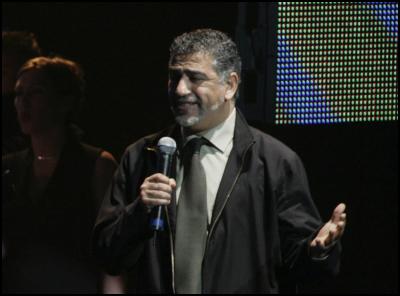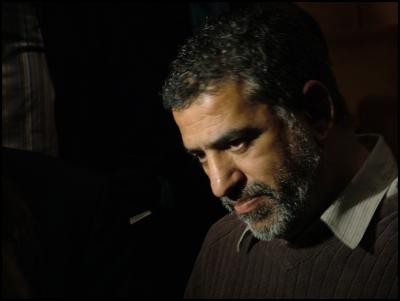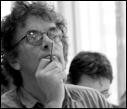Gordon Campbell: Zaoui Review Gets Underway
Gordon Campbell: Zaoui Review Gets Underway
Former Listener journalist Gordon Campbell will be writing about the Zaoui review for Scoop.
Today, five and a half years after Ahmed Zaoui arrived in New Zealand, the risk security certificate issued against him by the SIS will begin to be reviewed by SIS Inspector-General Paul Neazor.
The review will be carried out in private, and is scheduled to finish by Christmas.

Audio of 95bFM interview: Jose Barbosa and Gordon Campbell.
Does Ahmed Zaoui start the review of the evidence against him today assumed to be guilty – or is he presumed to be innocent until found otherwise? It seems fairly basic to know whether the review proceedings that begin today require Zaoui to disprove the case against him, or require the SIS instead to prove that its allegations hold water - but the legal process Zaoui has been embroiled in for the past five years remains unclear on this point. Certainly, when Green Party MP Keith Locke recently asked Justice Minister Mark Burton to clarify it, Locke’s Parliamentary written question was rejected on the grounds that Standing Orders prevent the Minister from venturing a legal opinion.
Typical. In my guesstimate, Zaoui starts the review presumed to be guilty. This is not a trial, where the rules of natural justice apply. It is in the nature of this process that once a risk security certificate has been issued, it has legal force – after all, Zaoui has had to appeal to the Inspector-General to halt the certificate from leading directly to his deportation. The certificate, in other words, carries intrinsic weight. One can argue about whether a mere bureaucrat should have such sweeping powers, but there it is.
That doesn’t mean the SIS does not have a test to meet. The Supreme Court confirmed in 2005 that the SIS needs to prove that Zaoui must be thought on reasonable grounds to pose a serious threat to the security of New Zealand; the threat must be based on objectively reasonable grounds and the threatened harm must be substantial.
Over the next few days, I am going to try and present what I think the SIS case might be, based on the available public evidence and working backwards from the Supreme Court test cited above. Unfortunately, the Court’s statement is grounded in terms that convey the sense that natural justice is still being done – words like reasonable, serious, objective, and substantial sound quite fair and balanced – but unfortunately, the actual process of the Zaoui review happens to be secretive, speculative, inferential and unbalanced. In reality, the Zaoui review is a process where the presumptions of guilt, the assumptions about relative credibility and the mechanisms for verifying the competing claims are all skewed in favour of the SIS, and towards the certificate being confirmed.
For one thing, the Inspector-General Paul Neazor has no independent research staff to assist him, and brings no expertise in immigration or security law to the task. In that respect, this watchdog role in New Zealand has none of the in-house expertise on immigration and security enjoyed by SIAC, its British counterpart. By default, the SIS Director is virtually the only security expert at the Inspector-General’s disposal. It is a situation of vulnerability, and ripe for capture.
Let me explain. Over the course of the next few weeks and months, the onus falls on Zaoui to disprove the conclusions that the SIS Director has drawn from the evidence – but in a situation where the ‘independent ‘watchdog supervising the process has no independent and balancing expertise to call upon. On the other side of the equation, the Zaoui defence team is even worse off. Zaoui’s lawyers are not allowed to even see - let alone to directly challenge - the key evidence for the allegations that are being tested.
Should a person’s life and freedom be judged by this kind of process, that lacks so many of the protections of the criminal justice system? It should be of concern that contrary conclusions can easily be drawn from much the same evidence. Should staunch opposition to a military junta be regarded as heroism, or as terrorism? In mid 2003 for instance, The Refugee Status Appeals Authority reached quite different conclusions to the SIS about how Zaoui’s prior convictions in Europe should be regarded.

However, as many observers have noted, disproving the SIS allegations against Zaoui – a good part of which are based on second or third hand information supplied by agencies offshore - is extremely difficult to do. By law, the classified evidence cannot be shown to Zaoui and his defence team for them to challenge and rebut. Inevitably, the defence is forced into the situation of rebutting what they have to guess the Crown case might be, and their own case is inevitably incomplete as a result – because they are not allowed to see, let alone to challenge the key evidence. At best, it is available to them only in summary form.
The High Court in 2004, saw the dangers clearly. As it said in its ruling on the apparent bias case taken successfully by the Zaoui defence team against the former Inspector-General :
His office was established to increase “the level of oversight and review” of the SIS among other agencies. He is specifically charged with ensuring that complaints, including a review of this nature, are ‘independently investigated’. Reference to his functions….emphasises the importance of complete independence from the Director. It is not
going too far to suggest that an “arm’s length” relationship is appropriate…On review of a certificate, the Inspector-General… must bring, and be seen to bring, an absolutely independent mind to the three specific steps in the review process, to determine “whether the certificate was properly made or not”. The Inspector-General’s distance from the Director and others on all aspects of this inquiry is critical.
Has the current Inspector-General kept that arms length distance – which, strictly speaking, would require him to meet the SIS Director only in formal contexts, and notified to the Zaoui team ? One might hope the Inspector-General has not availed himself of SIS guidance on the evidence, or on the relative credibility of the defence witnesses – and again, one would hope any private meetings with the SIS Director would be merely in the course of his inquisitorial process, and not be in any way conducted for guidance, or to access a second opinion.
Hope though, may be all one can muster. In this respect, it has always been disturbing that Neazor’s office has never been funded at a level sufficient to retain in-house expertise, or to contract it in. In Britain, similar investigations are required to be carried out by a panel comprising a retired judge, an expert in security issues and an expert in immigration law – precisely to ensure independence, and to minimise the risk of capture. No such safeguards apply here, with the Zaoui review.
Instead, New Zealand has followed a dubious British and Canadian precedent - and appointed two special advocates ( Stuart Grieve QC and Chris Morris) to examine the classified SIS material on Zaoui’s behalf. In rugby terms this is exactly like the All Blacks challenging the Springboks to a test match and putting their own best team on the park – and then forbidding the Springboks to play theirs, but giving them instead a year to train a team of novices to play in the Springbok jersey, and then cope on their own with whatever the All Blacks choose to throw at them.
 This situation mirrors exactly what has
happened with the Zaoui review. Once the Zaoui defence team
has trained the special advocates and the advocates have
seen the classified evidence, the advocates are then
forbidden to make contact with their coaches.
This situation mirrors exactly what has
happened with the Zaoui review. Once the Zaoui defence team
has trained the special advocates and the advocates have
seen the classified evidence, the advocates are then
forbidden to make contact with their coaches.
The media have also been made a party to the basic unfairness, by being excluded from the proceedings. The Zaoui review is being held in secret – and the media and the public have been barred from even those parts of the review that deal only with information already in the public domain. Amnesty International has also been refused permission to monitor the proceedings. Why?
There is no earthly reason why this ‘open evidence’ phase of the process shouldn’t be open to all and sundry – and the media should be being enabled and encouraged to play their Fourth Estate role, rather than forbidden from doing so. Especially when the first two weeks of the review at least will involve submissions only on publicly available material.
Have the media complained
bitterly about their exclusion? Not so far. The media may be
tigers when it comes to fighting for themselves and their
bosses when forbidden to use images from the coverage of
Parliament for purposes of satire, ridicule or denigration.
Yet when it comes to being excluded from witnessing and
reporting first hand on the country’s first high profile
national security case, they have taken it like lambs.
Tomorrow : What the SIS case may
entail.
 Disclosure : Gordon Campbell now
works as a media officer for the Green Party. He has been
writing about the Ahmed Zaoui case since 2003.
Disclosure : Gordon Campbell now
works as a media officer for the Green Party. He has been
writing about the Ahmed Zaoui case since 2003.
ENDS


 Keith Rankin: Remembering New Zealand's Missing Tragedy
Keith Rankin: Remembering New Zealand's Missing Tragedy Gordon Campbell: On Why The Regulatory Standards Bill Should Be Dumped
Gordon Campbell: On Why The Regulatory Standards Bill Should Be Dumped Martin LeFevre - Meditations: Psychedelics, Mystical Experiencing, And Organized Religion
Martin LeFevre - Meditations: Psychedelics, Mystical Experiencing, And Organized Religion Keith Rankin: Equity Rights - UBI, SUI, BUI, HUI, Or GUI?
Keith Rankin: Equity Rights - UBI, SUI, BUI, HUI, Or GUI? Binoy Kampmark: The Inevitable Souring - Elon Musk Falls Out With Donald Trump
Binoy Kampmark: The Inevitable Souring - Elon Musk Falls Out With Donald Trump Ian Powell: Postscript On Ethnic Cleansing, Genocide And New Zealand Recognition Of Palestine
Ian Powell: Postscript On Ethnic Cleansing, Genocide And New Zealand Recognition Of Palestine